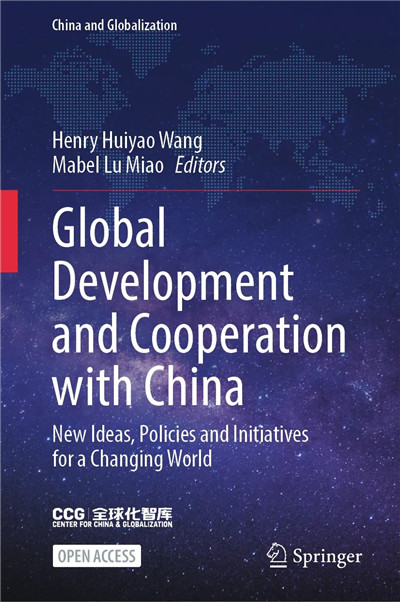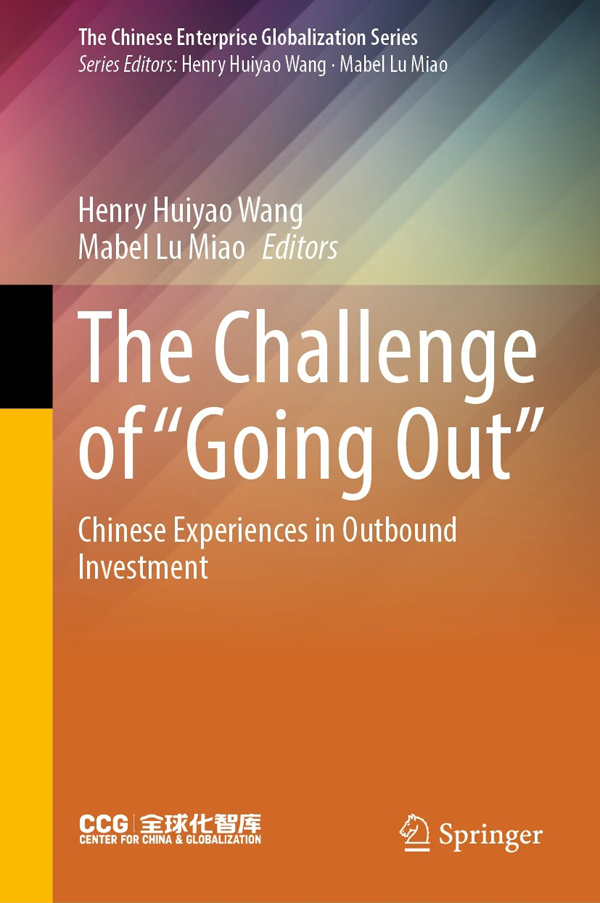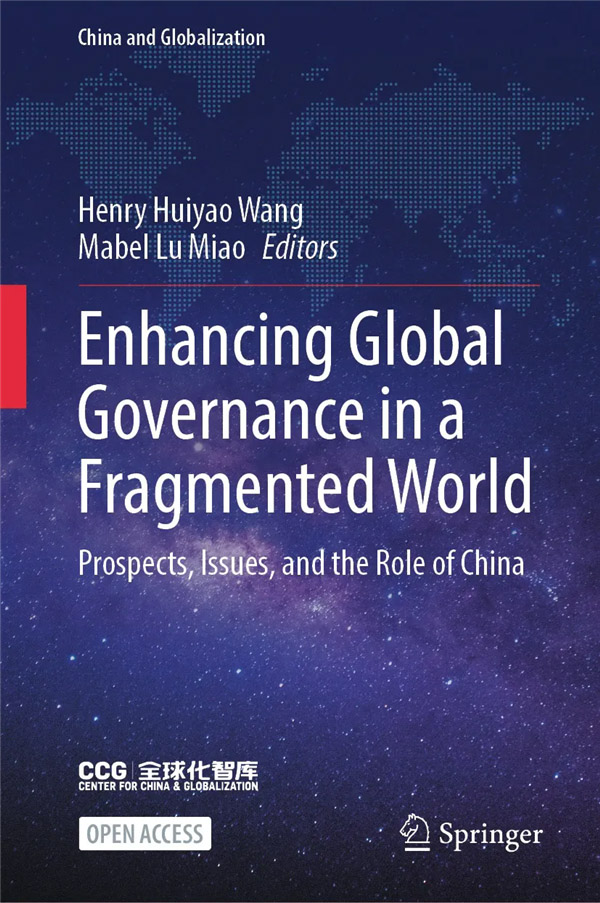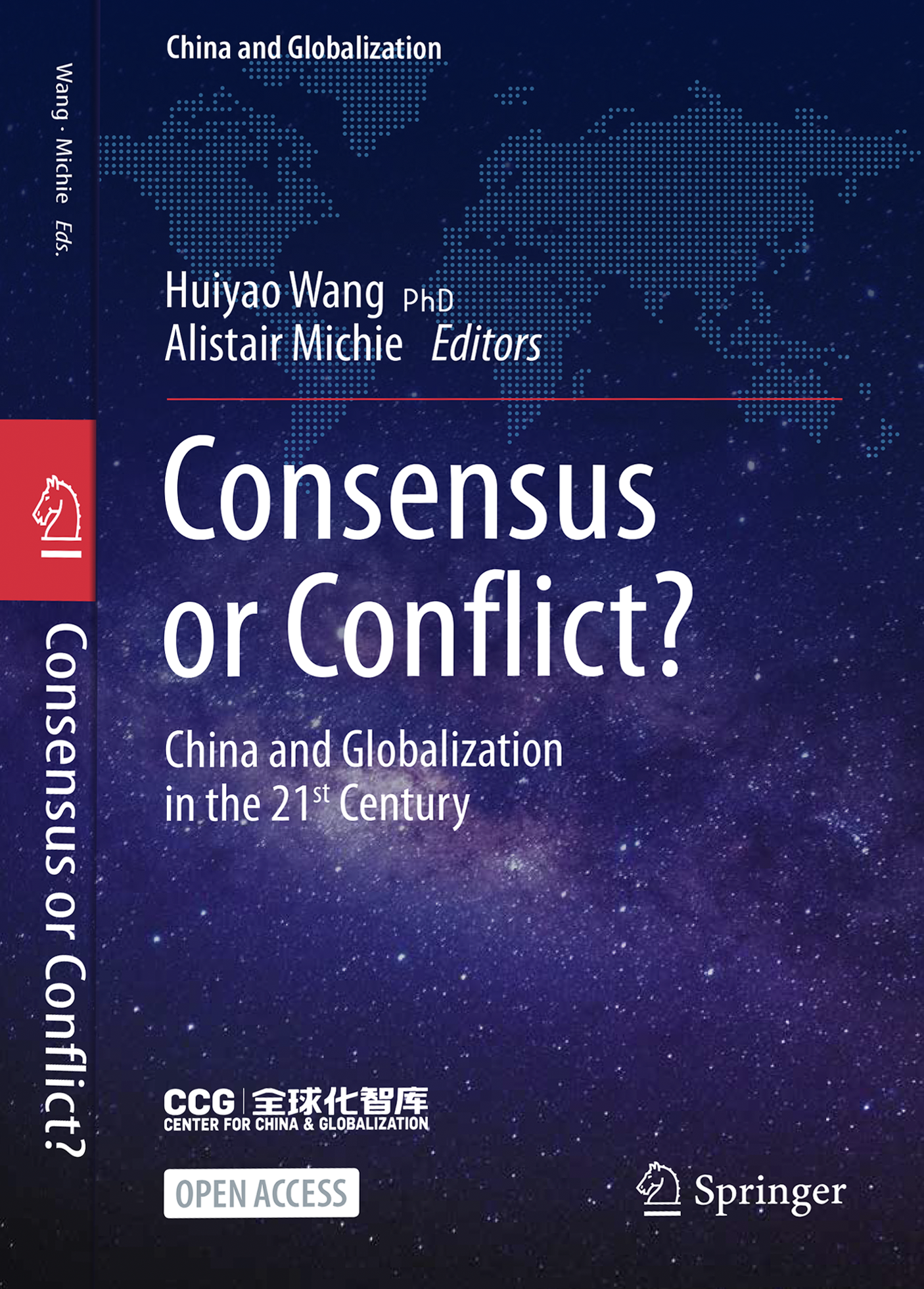
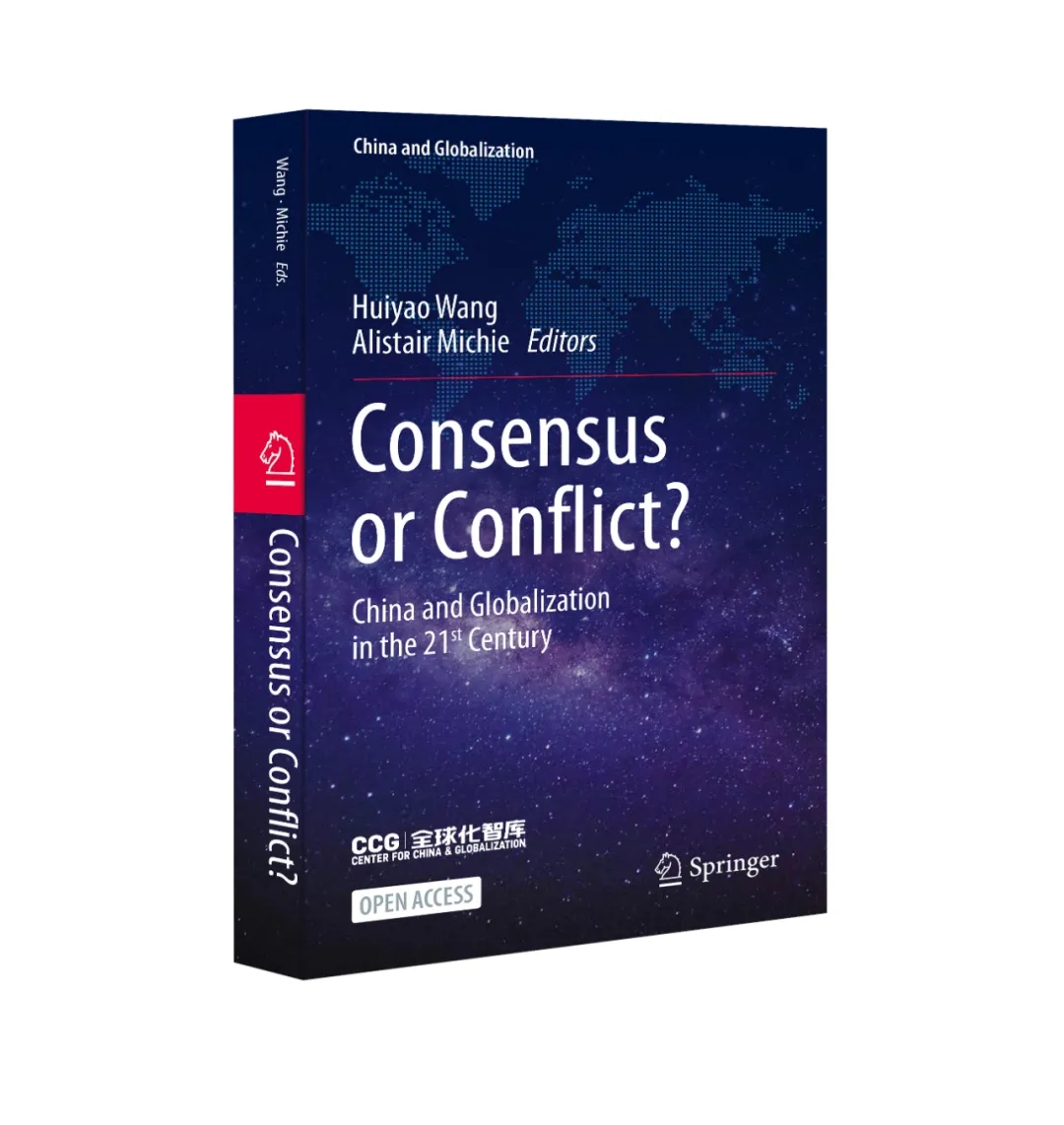 Consensus or Conflict? China and Globalization in the 21st Century is the first book in the China and Globalization series edited by Dr. Huiyao Wang and Dr. Lu Miao. This open access book brings together leading international scholars and policy-makers to explore the challenges and dilemmas of globalization and governance in an era increasingly defined by economic crises, widespread populism, retreating internationalism, and a looming cold war between the United States and China. It provides the diversity of views on those widely concerned topics such as global governance, climate change, global health, migration, S&T revolution, financial market, and sustainable development.
Consensus or Conflict? China and Globalization in the 21st Century is the first book in the China and Globalization series edited by Dr. Huiyao Wang and Dr. Lu Miao. This open access book brings together leading international scholars and policy-makers to explore the challenges and dilemmas of globalization and governance in an era increasingly defined by economic crises, widespread populism, retreating internationalism, and a looming cold war between the United States and China. It provides the diversity of views on those widely concerned topics such as global governance, climate change, global health, migration, S&T revolution, financial market, and sustainable development.
Consensus or Conflict?, edited by CCG President Wang Huiyao and Alistair Michie, Secretary General of the British East Asia Council, collects the combined wisdom of over 30 well-known international scholars and policymakers, receiving a warm welcome by readers with 55,000 downloads within a few days of its launch.
This is a truly unique book. Never before has such an authoritative group of essayists come together to develop deep new thinking about global governance that is relevant to current shared global challenges.
Our motivation for creating this book draws on the spirit and core culture of CCG. The first element of this book springs from the concept of “globalization,” which is not just part of CCG’s name but a deeply held belief that all of us at CCG share. We believe that a globalized world is a core component for the creation of a peaceful and sustainable world order that contributes to the mutual benefit of all mankind. The COVID-19 pandemic has unleashed forces that pose great challenges to the realization of a peaceful and sustainable world order, but it was also a major catalyst that motivated us to collaborate and co-edit this book.
Currently, a ‘flat, fused’ globalized world is racing ahead of the ‘rules-based’ order, just as Thomas L. Friedman, Pulitzer winner and New York Times columnist, said in a virtual forum with CCG on March 29, 2021: “That is the central governing challenge today. How do you govern the world that is that fast, fused, deep and open? That is our challenge.”
The 35 essays contained in this book were contributed by well-known authors including Pascal Lamy, Joseph S. Nye Jr., Edmund Phelps, Lord Jim O’Neill, Wendy Cutler, Peter Maurer, H. E. Shaukat Aziz, Grzegorz W. Kołodko, Guangyao Zhu, Yafei He, Jeffrey Lehman, Denis F. Simon and other 26 generous authors.
There were 38 contributors from North America, Europe, Africa and Asia, covering every corner of the globe, and contributors came from a wide spectrum of backgrounds including politics, academia, business, international organizations, research institutions and education institutions. These elements have provided this book with a professionalism and practicality that makes it a reliable source for multiple viewpoints.
The 35 pieces in this book are classified into seven parts:
In this book, leaders and scholars spell out why these perils pose a stark choice for the human race. They stress how any path that leads to conflict increases the risk of catastrophe. In this context, the common thread is that a consensus must be reached about the future of our world. Our writers have put forward many ideas and potential new policies, reflecting their vision of what this consensus should be and how it is the only way forward for the human race.
In part one – Policies for Changing the ‘Rules-Based World Order’ , we asked eleven eminent writers to express their views about the options for governance and globalization in the twenty-first century. The majority of our writers chose to analyze why the current ‘rules-based world order’ needs reform. Overall, most authors stressed that the need for change is extremely urgent.
Professor Amitav Acharya, Chair of Transnational Challenges and Governance of UNESCO, suggests that COVID-19 has ushered in a more pluralistic, multiplex world in the form of a “G20+ world” where the main players will not be just big powers or nation-states, but also institutions, corporations and networks, operating at multiple and intersecting levels.
H. E. Shaukat Aziz, former Prime Minister of Pakistan, references his experiences during the worst earthquake in Pakistan’s history to suggest the creation of a global one-stop-shop disaster relief unit under the auspices of the UN. He also uses his expertise as a top global banker to argue that the IMF and the World Bank must be restructured for the realities of the revolutionary digital and biosphere age.
The US scholar, economist and currently a China resident, Prof. David Blair, brings an authoritative perspective to the analysis of world governance. He believes the US is and, in the near term, will remain militarily and economically dominant and will use its power to impose a liberal and benevolent international system. However, he warns of the considerable danger of accidental conflict between the USA and China.
Professor Kerry Brown is a former diplomat and eminent Sinologist. In pushing reforms in global governance, both for the US and EU, he writes that, “there needs to be an acceptance that a radical difference in viewpoints with China has to proceed alongside a similarly crucial admission.” He stresses that it would be self-defeating not to work with China and that dis-engagement with China is not an option.
A Chinese view comes from Prof. Yafei He, a former Foreign Affairs Vice Minister and now a Distinguished Professor at Peking University. He proposes four points to consider in revising global governance. First, avoid zero-sum geopolitics. Second, defend globalization and free trade. Third, take global poverty alleviation seriously. And fourth, restore the spirit of mutual assistance.
Professor Masahiro Kawai, former Deputy Finance Minister of Japan and now an esteemed scholar, provides the Japanese perspective. He proposes a way in which Japan can play a major role in addressing the reform of the ‘rules-based world order’. He contends that Japan could contribute by working with the US, the EU and China to reform the WTO and put it back on the center stage of global rule making for trade and investment.
Former Deputy Prime Minister of Poland, Prof. Grzegorz W. Kołodko, is now a renowned scholar known for creating the concept of “Chinism.” Chinism is a syncretic economic system based on multiple forms of ownership with strong macroeconomic policies and limited government control. In the context of China, Chinism has helped eliminate shortages and keep price inflation in check, something that none of the other models of state socialism were able to accomplish.
Pascal Lamy brings exceptional knowledge to reforming global governance as a former WTO Director General. He suggests that the world should not revolutionize the current system, and it is essential that a new order serves not only the established powers, but a greater number of the newly emerging nations. He concludes that globalization can continue to contribute to the betterment of mankind.
As a former Government Minister and now a senior scholar, Dr. Vladimir Yakunin provides a penetrating and authoritative perspective from the point of view of Russia. He emphasizes that “the current crisis is global and systemic in nature. On the one hand, this is an inevitable result of globalization. On the other hand, it is a result of defects in the existing economic model and global political system.”
Former Chinese Deputy Finance Minister Guangyao Zhu promotes the G20 and the UN as a means to reform global governance. He writes that, “the importance of multilateral governance systems in the resolution of COVID-19 cannot be overstated. The G20 has the ability to mobilize the resources of the the world. Also, maintaining political order and governance should be centred on the UN.”
Co-editor of this book, Huiyao Wang, propounds that, as we emerge from COVID-19, there is a unique opportunity for a long-overdue “Bretton Woods 2.0” moment to rethink global governance. China can help lead this by supporting the strengthening of existing institutions, for example, transforming the Asia Infrastructure Investment Bank into the Global Infrastructure Investment Bank.
In part two – Policies to Reform Governance in Public Health and Humanitarian Services – three eminent writers share their views on public hearth reform.
Peter Maurer, President of the International Committee of the Red Cross, focuses on four key issues in this area. First, reconciling humanitarian, security, stability and peace-building agendas. Second, engaging in quiet but robust dialogues with the armed actors of today’s conflicts. Third, breaking cycles of violence, and fourth, striving for diverse partnerships to find a way through political stalemates.
Professor Yuanli Liu, a global public health expert based in Beijing, suggests that the COVID-19 pandemic has revealed to the world both the vulnerability and power of the human community. He focuses on the creation of vaccines in a fraction of the time that was the norm before 2020 to highlight the power of humanity while also warning against the vulnerability of multilateral mechanisms like the WHO that must not be allowed to weaken.
COVID-19 has exposed deep weaknesses in the governance of global health. This is the view of renowned economist Lord Jim O’Neill who created the acronym BRICS. He has urged the world to learn from COVID-19 in order to guide the reform of global public health from the ‘Global Review Into Antimicrobial Resistance (AMR)’ that was created in 2014. Lord O’Neill chaired the AMR review board that highlighted how antibiotic use is abused around the world.
In part three – Governance to Nurture the Next Generations Through Education, Exchange and Migration – five eminent writers give their suggestions on cultural and educational exchanges and migration.
Professor Sir Keith Burnett, the former President of the UK Science Council, stresses that high priority must be given to building personal relationships. Personal experiences can demolish so many of the simplistic notions held by non-Chinese people about China. He contends that without a greater comprehension of China, its history and its language, any understanding of the world is incomplete.
Jeffrey Lehman is the Inaugural Vice Chancellor of New York University in Shanghai. This explains why he has highlighted, in particular the value of the global network of transnational universities. He makes the case for global governance reform to ensure the value of intellectual curiosity, academic freedom and a radical openness to people who hold different worldviews so that they are respected and protected by governments.
Dr. James G. McGann is a global leader in the analysis of think tanks at the Lauder Institute, demonstrating how they play a vital role in education and scholarship. However, he also explains how the general trend of globalization has put think tanks at a disadvantage, requiring them to find new and innovative ways to present information so that they remain relevant in today’s world.
Dr. Lu Miao is Secretary-General of CCG and a scholar of migration and education. She explains that while talent migration makes a very significant contribution to global economic development, the global governance of talent migration is sorely neglected when compared to other economic sectors such as international trade and finance. She states that there is an urgent need for a new global infrastructure for talent migration.
Professor Sir Anthony Seldon, former Vice Chancellor of Buckingham University, gives four reasons for prioritizing educational links. First, he notes that the deeper the divide between nations the greater the need for cooperation. Shared history is the second reason. Third is shared learning. Finally, he warns that it is folly to not find ways of trading more with China, and befriending it, despite all the difficulties and differences of opinion.
In part four – Global Governance Trends and Dealing with the Digital and Biosphere Revolutions – five eminent writers propose their ideas on global digital data flows and biospheres revolutions.
Robert D. Atkinson is founder of the Information Technology and Innovation Foundation. Nigel Cory is an associate director covering trade policy at (ITIF). The two propound that data governance and the management of global digital data flows pose immense challenges for global governance. International digital data agreements must be embedded in revisions of the global ‘rules-based’ order and China should revise its restrictive approach so it can play a constructive role.
Dr. Hermann Hauser is Chairman of Amadeus Capital and has played a pivotal role in advancing the global digital revolution since its genesis. He exposes how the revolution in digital and biospheres has created new threats to national sovereignty. He emphasizes that the view of sovereignty built on military strength is outdated and nations are now exposed to economic coercion that is no less severe than military coercion.
Professor Peter Nolan is Director of the China Centre at Jesus College, Cambridge University. His analysis shows that the ‘Internet of Things’ needs to be considered as a comprehensive whole. The entirety of the ‘Internet of Things’ is dominated by firms from high-income countries, especially the USA, which has created great potential for conflict in global governance.
Professor Denis F. Simon is a scholar of Chinese business and technology at Duke University. He describes how the twenty-first century has been a dynamic period for international exchanges in science and technology. Globalization has enabled the almost unhindered movement of people, products and services and knowledge across borders, but he also questions if US–China tensions will inhibit these trends.
In part five – Global Governance Perspectives from Africa, Asia, North America and Europe – seven eminent writers provide their thoughts on the emerging international order.
Jean Christophe Bas is CEO of The Global Compass. Richard Higgott is Distinguished Professor of Diplomacy in the Brussels School of Governance at the Vrije Universiteit Brussels, Emeritus Professor of International Political Economy at the University of Warwick and Visiting Professor in Political Science at the University of Siena. The two argues that it is essential to block the drift towards a bi-polar world, calling on European Union foreign policy efforts to take a much more proactive and strategic role in revising the American led ‘rules-based world order’. His analysis also examines why Europe is struggling to develop a coherent position towards these challenges.
For many years Wendy Cutler was a leading official in US trade negotiations. She writes, “Twenty years ago, Asia accounted for less than a third of global output. Twenty years from now, Asia will account for more than half the world’s total economy. Now there is a serious danger that the US will miss its opportunity to shape trade rules and norms within the largest and most rapidly growing region in the world.”
COVID-19 has been a massive test of governance for nearly all nations. In that test, China has scored extremely well and the EU and USA have failed. This is the view of Prof. Martin Jacques, formerly a Senior Fellow at the University of Cambridge. He provides updates to When China Rules The World, which he published in 2009, and projects that the world is now in a period of ‘great transition’ of power from the west to China.
Opinions about the rise of Asia come from Parag Khanna, who is the founder of Future Map. His analysis stresses core trends: first, imagination and creativity, which will be crucial as the world changes faster and faster with technologies ranging from AI to gene therapy evolving at revolutionary speeds and colliding in novel and unexpected ways. Second, he suggests that complexity must be embraced.
Professor Kishore Mahbubani is a scholar and former diplomat who chaired the UN Security Council. He says the US has made three strategic mistakes. The first mistake was letting the top 1% in the US reap huge rewards from globalization. The second mistake was to weaken governmental institutions. The third mistake was to allow the top 1% to create a functional plutocracy in America.
A voice from Africa comes from Prof. Carlos Lopes from the University of Cape Town. He presents data to show how demography will shape global governance. The current population of Africa is 1.3 billion. Some forecast that will double by 2050. His essay says that narratives about Africa tend to be negative, but Africa will ultimately be home to 2.6 billion people that will make up a full quarter of the world’s population.
In part six – Lessons from History for the Next Steps in Global Governance and Trends – four eminent writers propound to learn experience from history on rebuilding global governance.
Professor Daniel A. Bell is a leading scholar of history and political science based in China, and cooperated with Pei Wang, an assistant researcher at China Institute, Fudan University, in their contribution to this work. The two writers expound on the rich legacy of the written world in China that goes back three millennia, where ancient theories can be mined for contemporary insights. One example he gives is how, in classical China, political thinkers developed rich and diverse theories of international politics that was based upon the hierarchy of states.
Ronnie C. Chan, as Chair of Hang Lung Group, has an exceptional business acumen, but in the broader context of world affairs, he turns to historical patterns to make sense of contemporary commercial trends and global governance. He highlights the impact of China’s ‘reform and opening’ up. He reveals patterns in history that illustrate how globalization has always been cyclical. He believes that as the US retreats into isolationism, China has unique opportunities to become a driver of systems of global governance.
The 2006 winner of the Nobel Prize in Economics, Edmund Phelps, suggests China should learn from history as it transits from a middle-to-high-income country. China has long enjoyed high growth rates as it has worked to catch up to rest of the world. If China is to make the leap from a middle-to-high-income country, then China must develop indigenous innovation and continue improving its institutions.
In part seven – ‘Soft Power’ in Governance, the Burden of Debt and the Crisis of Communications – three eminent writers offer their advice on dealing with global crises.
Former Dean of Harvard’s Kennedy School of Government, Prof. Joseph S. Nye Jr. coined the term ‘soft power’. He proposes that the US should create a “COVID Marshall Plan” to strengthen global healthcare systems. Such leadership could enhance US ‘soft power’ and by 2030 have a similarly significant geopolitical effect as the original Marshall Plan.
Sir Martin Sorrell provides perspectives as a member of an elite group of successful founders and leaders of multinational businesses. He says we need to think long and hard about how to pay for the extraordinary amount of necessary debt that has been accrued in the fight against COVID-19 — just as we are having to pay for the investment to tackle climate change, to counter inequalities and re-skill labour forces as a result of the disruption.
A crisis of communication is the proposition of Alistair Michie, Chair of the International Council of CCG. He stresses how the current crisis is corroding cohesion of individual societies. If this erosion persists, it will create even more severe impediments for global society to change and introduce the measures needed to counter challenges such as climate change. He believes that this crisis can be resolved through leadership from China and the US.
We believe that, given the sentiments expressed by our essayists, and the turmoil visible in the world in 2021, the publication of this book is extremely timely.
We wish to once again express our profound gratitude to all our authors. It is our very sincere wish that all of our readers are inspired by the diverse ideas expressed in this book and we believe our authors have provided the ingredients for a ground-breaking book. We hope that their thoughts will stimulate a fruitful dialogue on the future of global governance, which is so urgent and vital in today’s world, to meet the challenges mankind currently faces.
We also express our special thanks to Sir Danny Alexander, Sir Angus Deaton, Rana Mitter and other 9 distinguished leaders and scholars, for generously providing their endorsements after reading through the whole book.
Consensus or Conflict? We leave you to consider the many problems the world faces with a few words from Thomas L. Friedman, who so poignantly asked: “How do you govern a world that is that fast, fused, deep and open?”
Contributors(in alphabetical order by family name)
Amitav Acharya
Chair, Transnational Challenges and Governance of UNESCO and Distinguished Professor, American University
Robert D. Atkinson
Founder and President, Information Technology and Innovation Foundation (ITIF)
H. E. Shaukat Aziz
Former Prime Minister, Pakistan
Jean Christophe Bas
CEO, The Global Compass
Daniel A. Bell
Dean, School of Political Science and Public Administration at Shandong University and Professor at Tsinghua University
David Blair
Senior Economist
Kerry Brown
Professor of Chinese Studies and Director of the Lau China Institute at King’s College, University of London, UK
Sir Keith Burnett
Chair, Academic Council for Schmidt Science Fellows at Oxford University
Ronnie C. Chan
Chair of Hang Lung Properties Limited and Chairman of Asia Society Hong Kong Center
Wendy Cutler
Vice President, Asia Society Policy Institute (ASPI)
Hermann Hauser
Chairman, Amadeus Capital, Cambridge UK and co-Founder, ARM Holdings
He Yafei
Former Vice Minister, Ministry of Foreign Affairs of China; Distinguished Professor, Peking University
Martin Jacques
Author of the global best-seller ‘When China Rules the World‘ and formerly Senior Fellow at the Department of Politics and International Studies, Cambridge University, UK
Masahiro Kawai
Representative Director, the Economic Research Institute for Northeast Asia; Professor Emeritus, University of Tokyo
Parag Khanna
Founder & Managing Partner, FutureMap
Grzegorz W. Kolodko
Professor, Kozminski University; Former Deputy Premier and Minister of Finance, Poland
Pascal Lamy
President, Paris Peace Forum
Jeffrey Lehman
Inaugural Vice Chancellor, New York University Shanghai
Yuanli Liu
Professor and Dean, School of Health Policy and Management, Peking Union Medical College
Carlos Lopes
Honorary Professor, University of Cape Town
Kishore Mahbubani
Distinguished Fellow, Asia Research Institute of National University of Singapore
Peter Maurer
President, the International Committee of the Red Cross (ICRC)
James G. McGann
Director, Think Tanks and Civil Societies Program, Wharton School and School of Arts and Sciences; Senior Fellow, Fels Institute of Government, University of Pennsylvania
Lu (Mabel) Miao
Founder & Executive Secretary General of CCG
Alistair Michie
Secretary General of the British East Asia Council; Chair, International Council of the Center for China and Globalization (CCG)
Peter Nolan
Professor and Director, China Centre, Jesus College, Cambridge University, UK
Joseph S. Nye Jr.
University Distinguished Service Professor, Emeritus and Former Dean of Harvard’s Kennedy School of Government
Lord Jim O’Neill
Chairman, Royal Institute for International Affairs
Edmund Phelps
Winner of the 2006 Nobel Prize in Economics, Director of the Center on Capitalism and Society at Columbia University
Sir Anthony Seldon
Former Vice-Chancellor, University of Buckingham
Denis F. Simon
Professor of China Business and Technology at Duke’s Fuqua School of Business, Former Executive Vice Chancellor of Duke Kunshan University(DKU)
Sir Martin Sorrell
Founder & Executive Chairman, S4 Capital, London, UK
Huiyao (Henry) Wang
Founder and President of Center for China and Globalization (CCG)
Vladimir Yakunin
Head of the State Policy Department, Faculty of Political Sciences, Lomonosov Moscow State University, Russia
Zhu Guangyao
Counsellor of the State Council, Former Vice Minister of Finance of China
[Book Introduction Video]
Download Book at Springer
https://link.springer.com/book/10.1007/978-981-16-5391-9
Browser, Download & Buy Book at Amazon.com:
https://www.amazon.com
